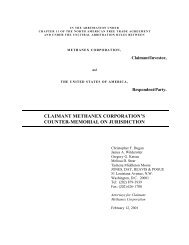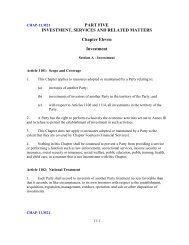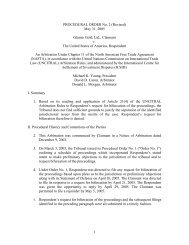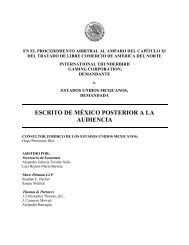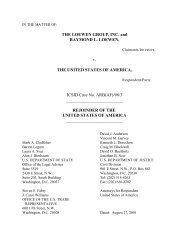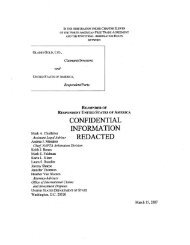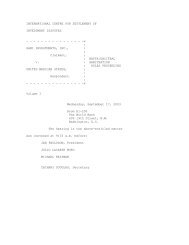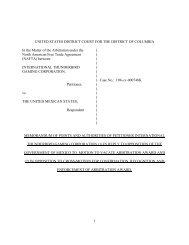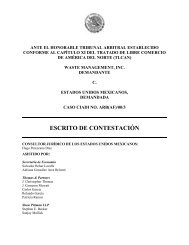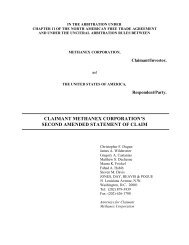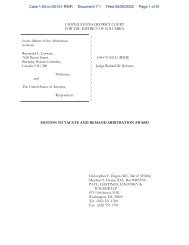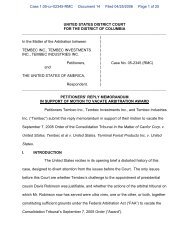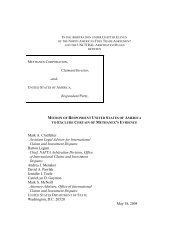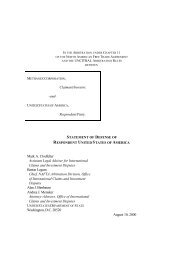GRE - USA - Costs Submission - US Department of State
GRE - USA - Costs Submission - US Department of State
GRE - USA - Costs Submission - US Department of State
You also want an ePaper? Increase the reach of your titles
YUMPU automatically turns print PDFs into web optimized ePapers that Google loves.
UNDER THE ARBITRATION RULES OF THE<br />
UNITED NATIONS COMMISSION ON INTERNATIONAL TRADE LAW<br />
AND<br />
THE NORTH AMERICAN FREE TRADE A<strong>GRE</strong>EMENT<br />
Counsel for the Claimants / Investors:<br />
Robert Luddy<br />
Windels Marx Lane & Mittendorf, LLP<br />
156 West 56th Street<br />
New York, New York 10019<br />
<strong><strong>US</strong>A</strong><br />
Todd Weiler<br />
Barrister & Solicitor<br />
2014 Valleyrun Blvd., Suite 19<br />
London, ON N6G 5N8<br />
Canada<br />
GRAND RIVER ENTERPRISES SIX NATIONS LTD.,<br />
JERRY MONTOUR, KENNETH HILL AND ARTHUR MONTOUR,<br />
- and -<br />
THE GOVERNMENT OF THE UNITED STATES OF AMERICA<br />
CLAIMANT’S POST-HEARING SUBMISSION<br />
MARCH 31, 2010<br />
Leonard Violi<br />
Offices <strong>of</strong> Leonard Violi, LLC<br />
910 East Boston Post Road<br />
Mamaroneck, New York 10543<br />
<strong><strong>US</strong>A</strong><br />
Chantell Montour<br />
Inch Hammond Pr<strong>of</strong>essional Corporation<br />
1 King Street West, Suite 1500<br />
Hamilton ON L8P4X8<br />
Canada<br />
Claimants / Investors<br />
Respondent / Party
1. Hereunder the Claimants provide information concerning pr<strong>of</strong>essional fees expended by them, both in<br />
prosecution <strong>of</strong> the arbitration under NAFTA Chapter 11 and in defending against the measures at issue in the<br />
arbitration. Two tables are attached to this submission. The first provides an accounting <strong>of</strong> the pr<strong>of</strong>essional fees<br />
claimed by the Investors in this arbitration, recoverable as costs. The second provides a final accounting for all<br />
pr<strong>of</strong>essional fees incurred in defence <strong>of</strong> the measures, which are recoverable as damages, as claimed at<br />
paragraph 336 <strong>of</strong> the Claimants’ Memorial, and again at paragraph 201 <strong>of</strong> the Claimants’ Reply Memorial.<br />
I. COSTS<br />
2. The Claimants submit that, in the event that they ultimately prevail in this arbitration, they are entitled to<br />
their costs on a full indemnity basis. An award <strong>of</strong> the Claimants’ costs in prosecuting the arbitration is necessary<br />
to return the Claimants to the place they would have occupied but for the breach <strong>of</strong> the Respondent’s NAFTA<br />
obligations by certain <strong>of</strong> its state governments.<br />
3. The Respondent has also indicated that it is seeking costs on a full indemnity basis, should it prevail.<br />
However, should the Respondent prevail, the Claimants submit that the tribunal should consider the prevailing<br />
practice <strong>of</strong> investment treaty arbitration tribunals, which is not to award costs against an investor/claimant when<br />
a legitimate claim has been alleged but dismissed, absent evidence <strong>of</strong> bad faith or misconduct on the part <strong>of</strong> the<br />
claimants or their counsel.<br />
Applicable Law<br />
4. This arbitration is governed by the UNCITRAL Arbitration Rules. 1 Articles 38 and 40 <strong>of</strong> the UNCITRAL<br />
Rules provide the Tribunal with the authority to determine allowable costs, and the discretion to apportion such<br />
costs as between the parties.<br />
5. Article 38 provides the Tribunal with the authority to fix the costs <strong>of</strong> the arbitration. It sets out an<br />
exclusive list <strong>of</strong> expenses that qualify as “costs” for the purposes <strong>of</strong> Articles 38 and 40. Article 38 states:<br />
The arbitral tribunal shall fix the costs <strong>of</strong> the arbitration in the award. The term “costs” includes only:<br />
(a) The fees <strong>of</strong> the arbitral tribunal to be stated separately as to each arbitrator and to be fixed by the<br />
tribunal in accordance with article 39;<br />
(b) The travel and other expenses incurred by the arbitrators;<br />
(c) The costs <strong>of</strong> expert advice and <strong>of</strong> other assistance required by the arbitrators;<br />
1 UNCITRAL Arbitration Rules, 15 December 1976, U.N. Doc. A/31/17.
2<br />
(d) The travel and other expenses <strong>of</strong> witnesses to the extent such expenses are approved by the arbitral<br />
tribunal;<br />
(e) The costs for legal representation and assistance <strong>of</strong> the successful party if such costs were claimed<br />
during the arbitral proceedings, and only to the extent that the arbitral tribunal determines that the amount<br />
<strong>of</strong> such costs is reasonable;<br />
(f) The fees and expenses <strong>of</strong> the ICSID Secretariat in administering the hearings, as well as the services <strong>of</strong><br />
the Acting Secretary General as appointing authority in this arbitration.<br />
6. Article 40 divides these costs into two categories for the purposes <strong>of</strong> attributing or apportioning costs,<br />
namely: costs <strong>of</strong> legal representation and assistance (Legal <strong>Costs</strong>), 2 and all other costs (Arbitration <strong>Costs</strong>). 3<br />
Arbitration <strong>Costs</strong> are fixed according to the actual costs incurred by the parties in pursuing the arbitration, as<br />
determined by the tribunal. Legal <strong>Costs</strong> are fixed by the Tribunal, to the extent that such costs were claimed<br />
during the proceedings and were reasonable.<br />
7. Once the costs – as defined in Article 38 – have been fixed, Article 40 provides the method by which the<br />
Tribunal may, at its discretion, allocate them. The relevant portions <strong>of</strong> Article 40 provide:<br />
1. Except as provided in paragraph 2, the costs <strong>of</strong> arbitration shall in principle be borne by the<br />
unsuccessful party. However, the arbitral tribunal may apportion each <strong>of</strong> such costs between the parties if<br />
it determines that apportionment is reasonable, taking into account the circumstances <strong>of</strong> the case.<br />
2. With respect to the costs <strong>of</strong> legal representation and assistance referred to in article 38, paragraph<br />
(e), the arbitral tribunal, taking into account the circumstances <strong>of</strong> the case, shall be free to determine<br />
which party shall bear such costs or may apportion such costs between the parties if it determines that<br />
apportionment is reasonable.<br />
8. As per the foregoing text, Article 40 provides a formula for allocating legal costs and a formula for<br />
allocating arbitration costs, respectively. Article 40(1) establishes a presumption that the unsuccessful party<br />
shall bear the Arbitration <strong>Costs</strong>. This presumption is rebuttable, as the Tribunal may choose to apportion the<br />
Arbitration <strong>Costs</strong> between the parties if to do so would be reasonable in the circumstances <strong>of</strong> the instant case.<br />
There is no such presumption . Article 40(2) does not provide for a similar presumption with respect to the<br />
allocation <strong>of</strong> Legal <strong>Costs</strong>. The Tribunal is free to exercise its discretion in determining which party shall bear the<br />
Legal <strong>Costs</strong>, and in what proportion, on the basis <strong>of</strong> what is reasonable in the circumstances <strong>of</strong> the case.<br />
Assessing <strong>Costs</strong><br />
9. In order to prosecute their claim, the Investors incurred both Legal <strong>Costs</strong> and Arbitration <strong>Costs</strong>, as<br />
detailed in the following paragraphs.<br />
2 UNCITRAL Arbitration Rules, Article 40 (2).<br />
3 UNCITRAL Arbitration Rules, Article 40(1).
(i) Arbitration <strong>Costs</strong><br />
3<br />
10. Thus far, the Claimants have placed $375,000.00 on deposit with the ICSID Secretariat for payment <strong>of</strong><br />
Arbitration <strong>Costs</strong>, including arbitrators’ fees and costs incurred for hosting oral hearings. It is submitted that the<br />
Tribunal should assess the total for Arbitration <strong>Costs</strong> in this proceeding based upon the accounts maintained by<br />
the Tribunal Secretary, which will reflect the total costs incurred in administering the proceedings and hosting<br />
the oral hearings.<br />
(ii) Legal <strong>Costs</strong><br />
11. The Claimants have claimed Legal <strong>Costs</strong> from the outset <strong>of</strong> these proceedings, as required by Article<br />
38(e) <strong>of</strong> the UNCITRAL Arbitration Rules. 4 It is submitted that the Legal <strong>Costs</strong> set out in Table I, attached to<br />
this submission, are reasonable in respect <strong>of</strong> the representation required throughout these proceedings. The<br />
arbitration has progressed through two significant phases, in addition to a full exchange <strong>of</strong> arguments over the<br />
production <strong>of</strong> documents and a lengthy process <strong>of</strong> argumentation arising from the Respondent’s unsuccessful<br />
challenge to Pr<strong>of</strong>essor Anaya’s continued appointment to the Tribunal. As such, it is respectfully requested that<br />
the Tribunal exercise its discretion under Article 38(e) to “set” the Claimants’ Legal <strong>Costs</strong> in their entirety, as<br />
per the sums set out in Table I.<br />
12. The total claimed for legal services and disbursements provided by counsel to the Claimants in the<br />
prosecution <strong>of</strong> this arbitration was: $2,803,627.10 <strong>US</strong>D. The total cost for expert witnesses appearing for the<br />
Claimants was: $1,113,749.47 <strong>US</strong>D. Arguably, the costs <strong>of</strong> expert advice could be included as Arbitration<br />
<strong>Costs</strong>, as Article 38(c) <strong>of</strong> the UNCITRAL Rules contemplates costs <strong>of</strong> expert advice and other assistance<br />
required by the arbitral tribunal. Out <strong>of</strong> an abundance <strong>of</strong> caution, however, the Claimants have nonetheless<br />
included these expert costs as part <strong>of</strong> their legal representation and assistance, which accordingly totals:<br />
$3,917,376.57 <strong>US</strong>D.<br />
Apportioning <strong>Costs</strong><br />
13. With respect to the appropriate apportionment <strong>of</strong> costs in these proceedings, the Claimants note that the<br />
Respondent has not (yet) prevailed in its any arguments for outright dismissal <strong>of</strong> a claim for wont <strong>of</strong> jurisdiction.<br />
While it was partially successful in pursuing its jurisdictional challenge, on the basis that it was too late for<br />
certain claims to be brought in respect <strong>of</strong> the Escrow Statutes, as originally drafted, the Respondent was<br />
nonetheless unable to demonstrate that even these measures fell totally beyond the purview <strong>of</strong> the Tribunal’s<br />
jurisdiction. As such, the preliminary hearing on jurisdiction did not categorically remove examination <strong>of</strong> any <strong>of</strong><br />
4 See: Notice <strong>of</strong> Arbitration, March 12, 2004, at para. 81(ii); Particularized <strong>State</strong>ment <strong>of</strong> Claim, June 29, 2005, at<br />
para. 166(iii); and Memorial on Merits, July 10, 2008, at para. 337(ii).
4<br />
the measures at issue from necessary consideration during the merits phase <strong>of</strong> the arbitration. In other words, a<br />
hearing on the merits was still necessary to determine whether <strong>State</strong> Responsibility was incurred through the<br />
implementation and/or enforcement <strong>of</strong> any <strong>of</strong> the measures originally named in the Notice <strong>of</strong> Arbitration and<br />
Particularized <strong>State</strong>ment <strong>of</strong> Claim. This result should be weighed in favour <strong>of</strong> apportioning a larger share <strong>of</strong> the<br />
burden for Arbitration <strong>Costs</strong>, for the jurisdictional phase <strong>of</strong> the proceedings, to the Respondent, in line with the<br />
presumption set out in Article 40(1) <strong>of</strong> the UNCITRAL Arbitration Rules.<br />
14. The Claimants also recall how the Respondent was utterly unsuccessful in persisting in its challenge to<br />
the appointment <strong>of</strong> Pr<strong>of</strong>essor Anaya to the Tribunal, even though it was clear he had complied with the<br />
instructions he had received from the ICSID’s Acting Secretary General, as he was forced to confirm following<br />
an additional round <strong>of</strong> arguments by the parties. In addition, the Claimants recall how the Respondent’s acts <strong>of</strong><br />
obfuscation, during the production phase <strong>of</strong> the proceedings, resulted in significant, negative impacts upon both<br />
the parties and the Tribunal, by impairing the Tribunal’s ability to find facts as necessary.<br />
15. It is accordingly submitted that – regardless <strong>of</strong> whether the Claimants prevail on the merits – the<br />
Respondent’s obvious failure to produce relevant and material documents in its possession should attract a an<br />
apportionment against the Respondent <strong>of</strong> no less than $100,000.00 to $250,000.00 in Legal <strong>Costs</strong> incurred by the<br />
Claimants. The Respondent’s conduct caused unnecessary argumentation to be made, repeatedly, by the<br />
Claimants concerning the production <strong>of</strong> documents they knew to exist, but which were never provided. More<br />
importantly, the Respondent’s deliberate omission to provide relevant and material documents in its possession<br />
significantly hindered the Tribunal’s ability to determine the facts <strong>of</strong> the case, as demonstrated on a number <strong>of</strong><br />
occasions during the oral hearings.<br />
If the Claimants Prevail on the Merits<br />
16. In the event that the Claimants prevail on the merits <strong>of</strong> their claim(s), it is submitted that they are entitled<br />
to receive their entire share <strong>of</strong> the Arbitral <strong>Costs</strong>, on a full indemnity basis, in accordance with the logic <strong>of</strong><br />
Article 40(1) <strong>of</strong> the UNCITRAL Arbitration Rules. As the tribunal in S.D. Myers explained:<br />
The logical basis for this policy appears to be that the “successful” claimant has in effect been forced to<br />
go through the process in order to achieve success, and should not be penalized by having to pay for the<br />
process itself. The same logic holds good for a successful respondent, faced with an unmeritorious claim. 5<br />
17. While the Claimants acknowledge that the Tribunal has discretion to depart from this basic principle,<br />
they submit that if it is successful in this arbitration there is no cause for the Tribunal to do so. In cases in which<br />
5 SD Myers Inc. v Canada, Final Award and Dissenting Opinion, IIC 251 (2002), 30th December 2002, Ad Hoc<br />
Tr (UNCITRAL), at para. 15.
5<br />
a tribunal has decided to depart from this principle and award less than full Arbitral <strong>Costs</strong>, factors at play have<br />
included:<br />
a. the manner in which the claimant conducted the arbitration; 6<br />
b. the results on various liability issues; 7 and<br />
c. the difference between the amounts claimed and the amount ultimately awarded. 8<br />
d. the Claimants does not anticipate that any <strong>of</strong> these factors will apply if its claim is successful.<br />
18. It is further submitted that, in the event that they prevail in any <strong>of</strong> their claims, the Claimants are entitled<br />
to receive an award for their Legal <strong>Costs</strong>, on a full indemnity basis. If the Claimants prevail in any <strong>of</strong> their<br />
claims, <strong>of</strong> necessity the Tribunal will have found that the United <strong>State</strong>s manifestly failed to meet international<br />
law standards, and has remained non-compliant – continuing to injure the Claimants – for many years. Such<br />
conduct by a <strong>State</strong> requires condemnation in the strongest <strong>of</strong> terms, as a matter <strong>of</strong> international public policy. In<br />
addition, an award <strong>of</strong> costs would also be appropriate to ensure that the Claimants would be made whole, as per<br />
the fundamental principles <strong>of</strong> compensation espoused in the customary international law <strong>of</strong> <strong>State</strong> responsibility.<br />
If the Claims are Dismissed<br />
19. The Claimants submit that it remains a relative rarity in investment treaty arbitration for an unsuccessful<br />
claimant to be directed to pay for more than half <strong>of</strong> the Arbitration <strong>Costs</strong>, or any portion <strong>of</strong> the respondent’s<br />
legal fees. The exceptions to this general practice include cases where the Tribunal has determined that the<br />
claim was manifestly without merit or that its prosecution by the Claimant, or its counsel, fell below commonly<br />
accepted pr<strong>of</strong>essional standards. 9 The purpose <strong>of</strong> this policy is to avoid placing additional constraints upon<br />
access to justice for small and medium sized investor enterprises, or by individual investors.<br />
20. The policy against awarding costs in favour <strong>of</strong> a successful respondent was observed in Azinian v.<br />
Mexico, where the tribunal concluded that – despite the fact that some <strong>of</strong> the Claimants’ claims were manifestly<br />
6<br />
See e.g. S.D. Myers at para. 26;<br />
7<br />
See e.g. S.D. Myers at para. 16; Pope & Talbot Inc. v Canada, Award on <strong>Costs</strong>, IIC 196 (2002), 26th<br />
November 2002, Ad Hoc Tr (UNCITRAL), at para. 18.<br />
8<br />
See e.g. S.D. Myers at para. 17.<br />
9<br />
See e.g. Methanex Corporation v United <strong>State</strong>s, Final Award on Jurisdiction and Merits, IIC 167 (2005),<br />
(2005) 44 ILM 1345, August 3 rd , 2005, Ad Hoc Tr (UNCITRAL), at Part II, Chapter I, para’s. 53-60 where the<br />
Claimant was found to have sanctioned trespass to property in order to secure evidence and to have made<br />
misrepresentations to both the Tribunal and a United <strong>State</strong>s Federal Court, in respect <strong>of</strong> its attempt to have the<br />
same evidence procured by trespass produced by the Respondent in the arbitration.
6<br />
without merit – it would not be appropriate to apportion costs in favour <strong>of</strong> the Respondent. The tribunal<br />
observed:<br />
In this case, however, four factors militate against an award <strong>of</strong> costs. First, this is a new and novel<br />
mechanism for the resolution <strong>of</strong> international investment disputes. Although the Claimants have failed to<br />
make their case under NAFTA, the Arbitral Tribunal accepts, by way <strong>of</strong> limitation, that the legal<br />
constraint on such causes <strong>of</strong> action were unfamiliar. Second, the Claimant’s presented their case in an<br />
efficient and pr<strong>of</strong>essional manner. Third, the Arbitral Tribunal considers that. . . [the Mexican authorities]<br />
may be said to some extent to have invited litigation. Fourthly, it appears that the persons most<br />
accountable for the Claimants' wrongful behaviour would be least likely to be affected by an award <strong>of</strong><br />
costs. . . . 10<br />
21. As indicated in a recent study on costs awards in investment treaty arbitration, the majority <strong>of</strong> tribunals<br />
have not awarded costs in the cause to victorious respondents. 11 According to one commentator, this<br />
development:<br />
… raises questions as to whether treaty-based investment arbitration under NAFTA or ICSID gives rise to<br />
intrinsically different legitimate expectations <strong>of</strong> full cost recovery to the victorious investor than is the<br />
case in cost recovery in a non-investment commercial arbitration, and delegitimizes any expectations <strong>of</strong><br />
cost recovery on the part <strong>of</strong> the government party.<br />
Perhaps the unilateral right <strong>of</strong> an investor to sue means a unilateral expectation <strong>of</strong> cost recovery? Perhaps<br />
this form <strong>of</strong> arbitration and cost recovery is analogous to non-confidential judicial review <strong>of</strong><br />
administrative conduct, where the administrative body normally enjoys no possibility <strong>of</strong> cost recovery in<br />
the event <strong>of</strong> an unsuccessful claim against it? And perhaps assigning the risk to the investor claimant <strong>of</strong><br />
bearing the government respondent’s defence costs is inconsistent with the purpose <strong>of</strong> such investment<br />
treaties? 12<br />
22. In the present case, the Claimants commenced this arbitration in good faith to seek compensation for<br />
wrongs that they believed they had suffered due to the acts and omissions <strong>of</strong> a number <strong>of</strong> state governments, in<br />
10<br />
Azinian et al v Mexico, Award on Jurisdiction and Merits, ICSID Case No ARB(AF)/97/2, IIC 22 (1999),<br />
(1999) 14 ICSID Rev-FILJ 538, (2000) 39 ILM 537, (2002) 121 ILR 2, (2002) 5 ICSID Rep 272, 18th October<br />
1999, despatched 1st November 1999, ICSID, at para’s 125-126. See also Mondev International Limited v<br />
United <strong>State</strong>s, Award, ICSID Case No ARB(AF)/99/2, (2004) 6 ICSID Rep 192, IIC 173 (2002), (2003) 42 ILM<br />
85, (2004) 125 ILR 110, (2003) 15(3) World Trade and Arb Mat 273 , despatched 11th October 2002, ICSID, at<br />
para’s. 158-159. See, also: United Parcel Service <strong>of</strong> America Inc. v Canada, Award, IIC 306 (2007), 24th May<br />
2007, Ad Hoc Tr (UNCITRAL), at para. 188; Glamis Gold Limited v United <strong>State</strong>s, Award, IIC 380 (2009), 14th<br />
May 2009, despatched 8th June 2009, at para’s. 831-833; and Loewen Group Inc. and Raymond L. Loewen v.<br />
United <strong>State</strong>s, Award, ICSID Case No ARB(AF)/98/3, IIC 254 (2003), (2005) 7 ICSID Rep 442, (2003) 42 ILM<br />
811, 25th June 2003, despatched 26th June 2003, ICSID, at para. 240: “[T]he Tribunal is <strong>of</strong> the view that the<br />
dispute raised difficult and novel questions <strong>of</strong> far-reaching importance for each party, and the Tribunal therefore<br />
makes no award <strong>of</strong> costs”].<br />
11<br />
Walid ben Hamida, “The Cost Issue in Investor-<strong>State</strong> Arbitration Decisions Rendered Against the Investor: a<br />
Synthetic Table,” 2 (2005) T.D.M. Issue No. 5.<br />
12<br />
Richard H. Kreindler, “Perspectives on <strong>State</strong> Party Arbitration: The Future <strong>of</strong> BITs – The Practitioner’s<br />
Perspective” (2007) 23 Arbitration International 43 at 59.
7<br />
violation <strong>of</strong> the Respondent’s NAFTA obligations. The Claimants’ claims were clearly neither frivolous nor<br />
vexatious, the type <strong>of</strong> which ought to be deterred by ordering costs against the Claimants.<br />
23. The Claimants submit that they presented their merits case in an efficient manner and that the arbitration<br />
raised novel and difficult questions related both to the highly complex nature <strong>of</strong> the measures at issue, and their<br />
application to tobacco enterprises, and to important legal questions, such as the interaction between customary<br />
international law duties owed to investors and customary international law rights enjoyed by indigenous peoples,<br />
as individual economic actors.<br />
24. For these reasons, the Claimants respectfully submit that, in the event that the United <strong>State</strong>s <strong>of</strong> America<br />
prevails in this arbitration, the Tribunal should issue an order directing that each party bear its own Legal <strong>Costs</strong>,<br />
and that the Arbitration <strong>Costs</strong> be divided evenly between the parties, subject to the submissions made above with<br />
respect to the Respondent’s persistence in maintaining an unmeritorious challenge to Pr<strong>of</strong>essor Anaya’s<br />
appointment and its manifest failure to produce relevant and material documents in its possession, contrary to the<br />
letter and spirit <strong>of</strong> the IBA Rules on Evidence.<br />
II. FINAL TOTALS FOR PROEFSSIONAL FEES AS PECUNIARY DAMAGES<br />
25. In both their Notice <strong>of</strong> Arbitration and Particularized <strong>State</strong>ment <strong>of</strong> Claimant, the Investors specifically<br />
articulated a claim for damages in respect <strong>of</strong> the pr<strong>of</strong>essional fees they incurred in defending against the<br />
imposition <strong>of</strong> all MSA implementation measures by state governments on the business <strong>of</strong> their investment in<br />
markets located in within the territory <strong>of</strong> the United <strong>State</strong>s, including enforcement actions. 13 As provided in both<br />
their Memorial on the Merits and their Reply Memorial on the Merits, 14 the Claimants indicated that they would<br />
provide the Tribunal with a total for the pr<strong>of</strong>essional fees they would be claiming under this head <strong>of</strong> pecuniary<br />
damages, as <strong>of</strong> the date <strong>of</strong> the oral hearing.<br />
26. Attached as Table 2 is a record <strong>of</strong> the pr<strong>of</strong>essional fees incurred by the Claimants in defending against<br />
the imposition and enforcement <strong>of</strong> any MSA-implementation measures against their investments within the<br />
territory <strong>of</strong> the United <strong>State</strong>s, as <strong>of</strong> the date <strong>of</strong> the oral hearing. The amounts have been divided into three<br />
categories: (1) fees incurred specifically in response to state government actions targeted at sales <strong>of</strong> the<br />
Claimants’ tobacco brands by NWS, to Indian Nations, Indians or Indian Enterprises, in Indian Country (i.e.<br />
their “on-reservation sales”); (2) fees and disbursements incurred to challenge the Escrow Statutes before the<br />
Federal Court for the Southern District <strong>of</strong> New York; and (3) all other fees incurred to challenge enforcement <strong>of</strong><br />
13<br />
Notice <strong>of</strong> Arbitration, March 12, 2004, at para. 81(iii); and Particularized <strong>State</strong>ment <strong>of</strong> Claim, June 29, 2005,<br />
at para. 166(iv).<br />
14<br />
Memorial, July 10, 2008, at para. 336; and Reply Memorial, March 3, 2009, at para. 201.
8<br />
the MSA measures against the Claimants. The totals for these three categories <strong>of</strong> fees claimed as pecuniary<br />
damages are: $3,977,129.50 for prosecution <strong>of</strong> the Federal Court case (seeking to end enforcement <strong>of</strong> the<br />
measures against the Claimants); $1,287,940.13 for defence <strong>of</strong> the Claimants’ brands distributed in Indian<br />
Country; and $2,817,849.06 for the Claimants’ defence <strong>of</strong> their <strong>of</strong>f-reserve markets from enforcement <strong>of</strong> the<br />
measures at issue in the arbitration.<br />
27. In the event that the Tribunal finds the conduct <strong>of</strong> any state governments, with respect to some or all <strong>of</strong><br />
the sales <strong>of</strong> their brands that took/take place in Indian Country, to have been inconsistent with the Respondent’s<br />
obligations under NAFTA Article 1105, it is submitted that all <strong>of</strong> the pr<strong>of</strong>essional fees incurred by the Claimants<br />
– in defending against such unlawful action – should be awarded under the head <strong>of</strong> pecuniary damages as<br />
claimed by the Investors. In addition, it would also lie for the Tribunal to award a portion <strong>of</strong> the fees incurred by<br />
the Claimants, in pursuing their challenge to the Escrow Statutes before the Federal Court for the Southern<br />
District <strong>of</strong> New York, because the object <strong>of</strong> that claim has been to prevent state <strong>of</strong>ficials from applying these<br />
measures to the Claimants’ business – whether or not sales <strong>of</strong> their brands took place in Indian Country.<br />
28. In the event that the Tribunal finds the conduct <strong>of</strong> certain states to be inconsistent with the Respondent’s<br />
obligations under NAFTA Article 1102, it is submitted that all <strong>of</strong> the costs incurred by the Claimants in<br />
challenging the Escrow Statutes before the Federal Court for the Southern District <strong>of</strong> New York should be<br />
awarded as pecuniary damages, because the focus <strong>of</strong> the Claimants’ challenge before that Court has been on<br />
addressing the more favourable treatment made available to the Claimants’ competitors under these measures (in<br />
addition to fees attributable specifically to defence actions undertaken within the states <strong>of</strong> Georgia, Arkansas,<br />
North Carolina, South Carolina and Tennessee).<br />
29. In the event that the Tribunal finds the conduct <strong>of</strong> certain <strong>of</strong> the Respondent’s states to have been<br />
inconsistent with the Respondent’s obligations under NAFTA Article 1105, with respect to the imposition <strong>of</strong><br />
amended Escrow Statues (e.g.: on the basis <strong>of</strong> a failure to consult with First Nations, contrary to applicable<br />
customary international law norms, or a manifest denial <strong>of</strong> justice, contrary to customary international law), it is<br />
submitted that the entirety <strong>of</strong> the pr<strong>of</strong>essional fees paid by the Claimants in defence <strong>of</strong> these measures should be<br />
awarded as pecuniary damages, in order to make them whole (i.e. to place them in the position they would have<br />
occupied if the impugned conduct had never occurred).<br />
III. CONCL<strong>US</strong>ION<br />
30. For the foregoing reasons, and for the reasons included in the Claimants' previous written and<br />
oral submissions, the Claimants respectfully request that the Tribunal render an award pursuant to<br />
Article 40(1) and (2) <strong>of</strong> the UNCITRAL Arbitration Rules, ordering that the Respondent bear the costs
9<br />
<strong>of</strong> this arbitration, as well as the Claimants’ costs for legal representation and assistance, in the amount<br />
<strong>of</strong> $3,917,376.57.<br />
ALL OF WHICH IS RESPECTFULLY SUBMITTED, this 31 st day <strong>of</strong> March, 2010.<br />
_________________________<br />
Todd Weiler<br />
Barrister & Solicitor<br />
On behalf <strong>of</strong> the Claimants



